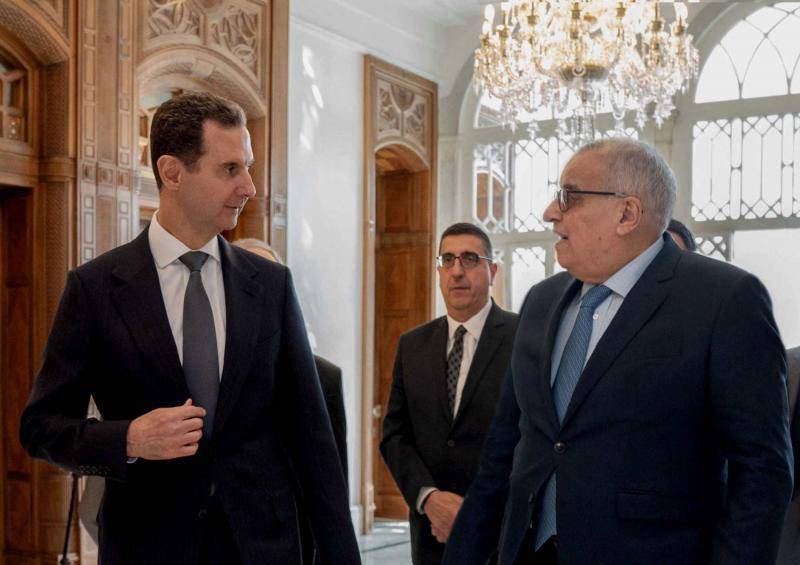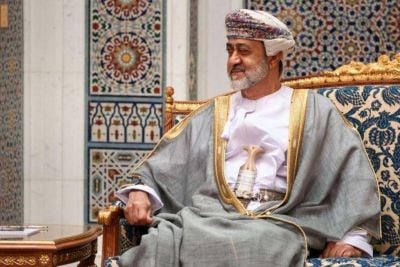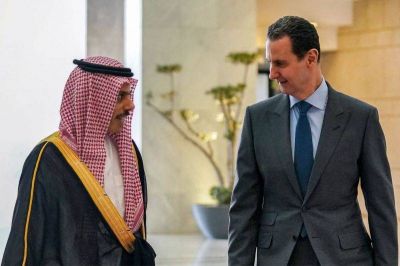
Abdallah Bou Habib, the outgoing Lebanese Minister of Foreign Affairs, is received in Damascus by Bashar al-Assad, on Feb. 8, 2023. (Credit: SANA/AFP)
Will Lebanon’s political class re-engage with Syria?
On Sunday, the Arab League agreed to readmit Syria into the organization, which raised questions about the future relations between the country and its neighbor, Lebanon.
Despite the brutal repression of pro-democracy protesters in 2011, Lebanon did not follow the lead of most Arab states in severing diplomatic ties with Bashar al-Assad’s regime. Nevertheless, the Syrian uprising had significant consequences for Lebanon, where political polarization between pro- and anti-Damascus forces has been in full swing.
As the international community and Arab nations boycotted the Syrian president, most of Lebanon’s key players distanced themselves from Damascus, with the exception of Hezbollah, which had gone as far as to engage in military operations alongside the Syrian army.
Twelve years later, while the Arab rapprochement vis-à-vis Damascus as part of a regional detente seems to be reassuring local actors, they are not in a rush to embrace President Bashar al-Assad just yet.
‘Guided by Arab consensus’
After Syria’s reinstatement in the Arab League was announced, some observers predicted that Lebanese leaders would immediately rush to Damascus in an attempt to reconnect with Assad. Since 2011, none of Lebanon's three most senior political figures — the president, the prime minister and the Parliament speaker — has visited Syria, and contacts between the two countries have been limited to security officials, ministers and MPs.
This is due to the Baabda Declaration, which was adopted by all of Lebanon’s key players during a national dialogue conference convened in June 2012 by then-President Michel Sleiman. The declaration called for the country to adopt a policy to distance itself from the conflict in Syria, as well as from the politics of regional axes in general.
Despite this, some political factions — particularly those aligned with the Syrian regime — view dialogue with Damascus as unavoidable.
They argue that dialogue with Damascus is the only way to address critical issues such as smuggling across the porous Lebanese-Syrian border and the increasingly contentious issue of the return of Syrian refugees, whose presence in the country has been increasingly decried by many Lebanese.
It is in this context that Free Patriotic Movement (FPM) leader Gebran Bassil welcomed Syria’s reinstatement into the Arab League during an interview with the LBCI television channel on Sunday.
“What happened today with Syria’s return to the League is a victory to which we contributed as Lebanese,” he said.
Bassil expressed his willingness to visit Syria to facilitate the repatriation of refugees.
“If the visit would be beneficial, Gebran Bassil will have no problem heading to Damascus,” said FPM spokesperson Maya Maalouf.
Caretaker Prime Minister Najib Mikati, who is backed by both the Amal Movement and Hezbollah, is rumored to be among those who may soon pay a visit to Damascus.
Mikati has denied these reports.
“I do not intend to visit Syria soon. However, there could be visits at the ministerial level to discuss common issues,” he told L’Orient-Le Jour.
Mikati emphasized that Lebanon is “guided by Arab consensus and that the re-establishment of ties between Syria and other countries in the region can serve Lebanon’s interests, particularly in resolving the refugee issue.”
During the ministerial meetings held in Amman and Cairo before Syria’s reinstatement in the Arab League, Damascus was called upon to ensure the safe return of Syrian refugees, among other conditions.
A committee, which includes the Lebanese caretaker foreign minister, has been established to oversee the implementation of these conditions.
A president first
With Mikati ruling out a visit to Damascus any time soon, speculations arise as to whether Parliament Speaker Nabih Berri will make the trip.
Berri has historically been close to the Syrian regime but distanced himself from Assad during the early years of the conflict, and relations between the two seemed at times to be hanging by a thread — a position that greatly dismayed Assad, according to several observers.
However, in the aftermath of the Feb. 6 earthquake that hit northern Syria, Berri was swift to send a parliamentary delegation, headed by his right-hand man, MP Ali Hassan Khalil, to Damascus.
Will Berri take advantage of Syria’s return to the Arab fold to renew personal ties with Damascus?
“For the moment, the priority is for issues at home. It is important to elect a new head of state and start finding solutions to the economic and political crises. The rest will come later,” a source close to the speaker told L’Orient-Le Jour, adding that Berri is not likely to make a trip to Syria imminently.
The normalization of relations between Arab countries and the Syrian regime, led by Saudi Arabia, could have a significant impact on electing a new head of state.
Lebanon has been without a president for six months due to a lack of consensus among the stakeholders, something that is not required by the constitution.
“We believe that the atmosphere of regional detente, and the Arab-Syrian rapprochement in particular, can benefit our [presidential] candidate Sleiman Frangieh,” the source close to Berri said.
The Zgharta strongman does not hide his closeness to the Assad family but does not wish to be elected without a green light from Saudi Arabia.
Recently, the Saudi ambassador in Beirut Waleed Bukhari, said the kingdom will not “veto any name,” throwing the ball into the Lebanese court.
On the other side of the political spectrum, the anti-Syrian parties also hope that the Arab opening to Damascus will benefit Lebanon.
“Regional appeasement could benefit all Lebanese, but it should not be seen as the victory of one side over the other,” said Razi Al Hajj, and MP for Metn affiliated with Samir Geagea’s Lebanese Forces, a party openly opposed to the Syrian regime.
For Hajj, however, high-level political contacts should not resume between the two countries.
“As long as there is no political solution or accountability in Syria, contacts with Damascus should be limited to the technical and security aspects,” he said.
The Progressive Socialist Party of Walid Joumblatt appears to be even more critical.
“Have the Syrian people been asked if they want to return to the Arab fold? Of course not. The Arab League is like the Titanic, which will inevitably sink the [Syrian] people,” Joumblatt said in a tweet.
“The regime has been granted freedom to act, and those who have escaped torture, prison and displacement will be wiped off the map by the tender embrace [of the Arab League],” he continued.
Bilal Abdallah, a PSP MP from Chouf, told L’Orient-Le Jour, “The Syrians are a brotherly people. Our party will not reconsider its relations with Bashar al-Assad, but when a new [Lebanese] president is elected and a government is formed, we will be able to deal with Syria like any other sovereign state, according to the interests of Lebanon determined by the cabinet.”
This article was originally published in French in L'Orient-Le Jour. Translation by Sahar Ghoussoub.


